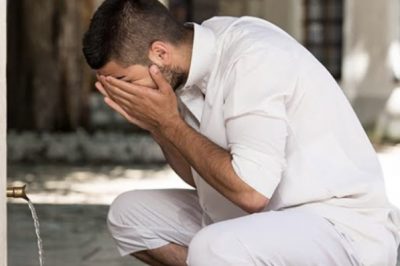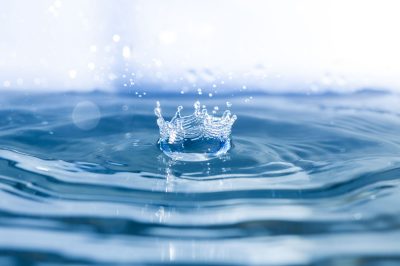Answer
Short Answer: Not exactly. There are some differences in the way Islam and Christianity view the body and soul, and in the way they view water and its purifying properties. But, Muslims do ritually purify themselves of sin with water fairly often in wudu, or the ablution one makes before prayer, and ghusl, or the whole-body shower one takes after sexual intercourse/pleasure of any sort.
Salam (Peace) Sarah,
Thank you for your question and for contacting Ask About Islam.
Body & Soul
One of the fundamental distinctions between Islam and Christianity lies in their view of the relationship between body and soul.
This also indirectly reveals a difference in the value they both give to water.
Where Islam assumes a unity of body and soul, along with an original innocence that does not require ritual salvation, but one based on deeds and individual accountability, Christian philosophy sees the two–body and soul–as independent entities.
Inspired by Plato’s philosophy of dualism, it conceives of a rational, controllable mind or soul, as well as a body that is governed by blind necessity and that cannot always be kept in check by the mind.
The idea of a separation of body and soul was adopted by the Church and strongly dominated the ideology of early Christian ascetics.
They believed physical suffering and deprivation would purify the spirit and bring the faithful closer to Christ, leading to decidedly questionable ideas about purity and cleanliness.
Water in Islam vs. Christianity
As for Islam, the unity of body and soul meant regular ablution and bathing, as a religious requirement linked to the very notion of worship.
Christian baptism, in which newborn babies – or adults – are blessed by holy water and accepted into the Church, also reveals a different view of water in the two religions.
In Islam, water is pure and sent as a gift from Allah. This is repeated many times in the Quran, as in Surah 77, verse 27:
We provided you with sweet water.
According to Islam, all water – as long as it is mutlaq (absolutely natural, free from impurities) – can be used for ablution.
The “holy” water that is used in Christian baptism is of a different nature; it is not just any water, but water that has been blessed in the name of Christ.
This blessing it thought to give the water a special quality, an added value that sets it apart and elevates it above other water.
As for Islamic doctrine, it ascribes purity to water. The Quran says in Surah 22, verse 5:
And you see the land dried up, but when We send down water upon it, it trembles, and swells, and grows […]
Also, wudu’ (ablution before prayers) and ghusl (bathing from physical impurity, as monthly menstruation or marital sexual intercourse, etc.) are both part of the act of worship, rituals that are mandatory to perform prayers.
More than Just Physical Purity
Still, this prohibition has nothing to do with physical purity. It is purely a question of reverence towards the idea of standing to pray to Allah.
Thus, physical purity alone does not suffice to arrive at a state of tahara, ritual purity.
Ablution should not be carried out mechanically, but only after niyya (intention) is made: the silent expression of sincerity and obedience to God.
This is the spiritual component of the purification ritual: while the body is purified with water, the mind must be completely focused on God.
The physical and spiritual components of the purification ritual reflect the Islamic principle of tawhid (oneness): body and mind should be united in the performance of religious duties, to become one, worshiping God, the One and Only.
The word “Islam” itself means “surrendering to God”, and Muslims–those who have surrendered to God–do so with body and soul.
An inscription in the baths of Granada’s old Moorish Quarter expresses this link between physical and spiritual purity.
It says that the body is the mirror of the soul, and therefore “outer stains suggest inner ones as well.”
Wudu’ and Ghusl
There are two types of purification by water in Islam.
Wudu’, the minor purification carried out before prayer, consists of washing the hands, the face, the forearms, the feet and sweeping by the head.
The hadiths explain that by performing wudu’ the believer kind of washes away sin.
Thus when a believer washes his face during wudu’, it is said that every sin that he/she contemplated with his/her eyes is washed away from his/her face with the last drop of water.
When he/she washes his/her hands, every sin they wrought is effaced.
And when he/she washes his/her feet, every sin toward which his/her feet have walked, is washed away, until he/she comes out pure of all sins.
As for ghusl, it is the major purification, which cleanses the whole body from impurities and is required after sexual intercourse, menstruation, childbirth, before adopting Islam, and after death (performed for the deceased by a close relative).
Also, it is recommended before important celebrations and during hajj (pilgrimage). Muhammad (peace be upon him) advised his followers to bathe at least every Friday, clean their body, cut their fingernails and add nice scents to their hair and clothes.
Conclusion
Much can be said about how the notion of original innocence was also reflected in a close relation between the Muslim and nature.
We live on earth not because we left paradise, but because we were destined to live on it!
And, we enjoy its purity and use its waters to purify our bodies and soul in daily life.
As there is no concept of incarnation or embodiment in the notion of divinity in Islam, water is a blessing.
It is not sacralized by human words, but by the initial creation of it by God.
We can use this issue to explore the core of Tawhid – oneness and transcendence of God – but this is a very vast issue that needs separate elaboration.
And Allah knows best.
I hope this helps.
Salam and please keep in touch.
(From Ask About Islam archives)
Please continue feeding your curiosity, and find more info in the following links:



